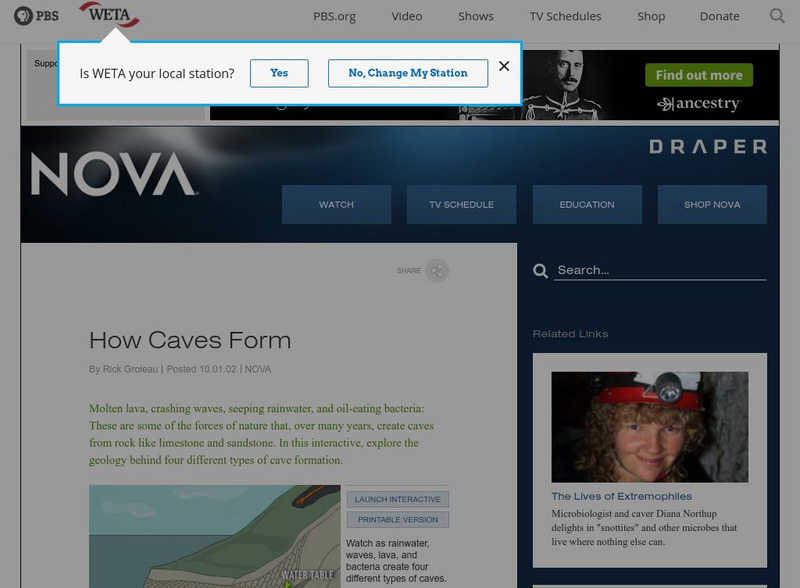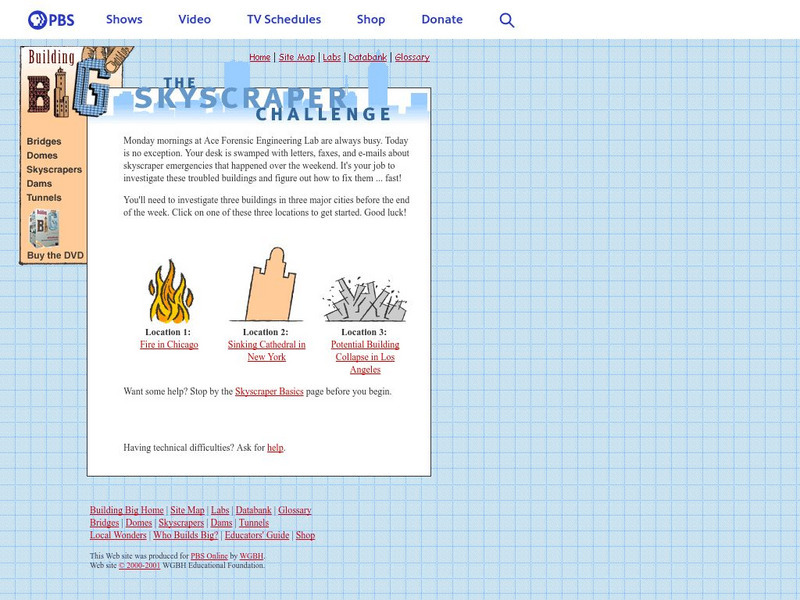PBS
Pbs Learning Media: Observe Images of Different Climate Zones
Interact with this world map from McDougal Littell/TERC to highlight different climate zones and see a photograph of each one. Ten climate zones are represented, including tundra, desert, humid subtropical, and others.
PBS
Pbs Learning Media: How Caves Form
This interactive activity from NOVA Online shows four different ways in which caves are formed: by rainwater, waves, lava, and bacteria.
PBS
Pbs Learning Media: Puppy Walker
This Zoom video segment features Brett, a boy who trains puppies to be seeing-eye dogs.
PBS
Pbs Learning Media: Grassland Elephants
This video segment from Nature features a greeting ceremony by grassland elephants in Kenya.
PBS
Pbs Learning Media: Civil Rights Activist, Fannie Lou Hamer
A profile of the life and leadership of Fannie Lou Hamer, a civil rights activist best known for her stirring testimony at the 1964 Democratic National Convention.
PBS
Pbs Learning Media: Mitosis
This video segment, adapted from the Interactive Secret of Life videodisc, explains the stages of mitosis, the process of dividing equally a cell's massive jumble of DNA just prior to cell division. [1:34]
PBS
Pbs Learning Media: Snapshot of u.s. Energy Use
This video segment adapted from NOVA/FRONTLINE looks at American energy consumption and the resulting production of greenhouse gases. [4:59]
PBS
Pbs Learning Media: Columns: Finding the Strongest Shape
In this video segment, members of the ZOOM cast experiment by bending and folding sheets of paper into various shapes to see which shape will support the weight of a heavy book. [3:33]
PBS
Pbs Learning Media: The Electromagnetic Spectrum: Frontline
This video segment adapted from FRONTLINE introduces the electromagnetic spectrum and explains how the various types of electromagnetic waves are distinguished by the amount of energy each wave carries.
PBS
Pbs Learning Media: Fossilized Dinosaur Bones
This still collage produced for Teachers' Domain features a variety of images of fossilized dinosaur bones, which provide evidence for the existence of these fascinating reptiles.
PBS
Pbs Learning Media: Aiming for the Basketball Hall of Fame
In this video segment from TV 411, two Atlanta Hawks players plan a driving route to reach the Basketball Hall of Fame. They use map scales to estimate their travel distances.
PBS
Pbs Learning Media: Pizza Toppings
This Cyberchase video features Bianca who uses Venn Diagrams to make a pizza that satisfies the topping preferences of her friends.
PBS
Pbs Learning Media: Frog Hops, Part 2
In this video from Cyberchase, the CyberSquad must figure out the new input/output pattern on Hacker's larger cyberfrog.
PBS
Pbs Learning Media: Using a Coordinate Grid
In this Cyberchase video segment, the CyberSquad must locate each other using a map's grid to construct a coordinate system using letters and numbers.
PBS
Pbs Learning Media: The Skyscraper Challenge
In this interactive activity from the Web site developed for the PBS series "Building Big," investigate hypothetical structural emergencies and figure out how to repair them.
PBS
Pbs Learning Media: Embryo to Duckling
This video segment from NOVA: "The Shape of Things" follows the growth of a duck embryo, from a single fertilized egg cell to a complex, hatching duckling. [1:19]
PBS
Pbs Learning Media: Duck Development
This video segment from NOVA: "The Shape of Things" follows the growth of a duck embryo, from a single fertilized egg cell to a complex, hatching duckling. [2:43]
PBS
Pbs Learning Media: Curious George: Sail a Boat
In the Curious George video Junky Monkey, George sees treasures where others see trash. He transforms his junk collection into a masterpiece- reusing and recycling items from the street. Will the mayor declare George and his friends the...
PBS
Pbs Learning Media: Pitch: Straw Kazoo
This video segment, adapted from ZOOM, explores the different sounds that a simple drinking straw can produce when you cut the straw and blow into it. [1:56]
PBS
Pbs Learning Media: Nuclear Reaction: Meltdown
What happens when a nuclear reactor overheats? This video segment adapted from FRONTLINE looks at the nuclear reactor meltdown at Chernobyl, the worst accident of its kind.
PBS
Pbs Learning Media: Birth of a Supernova, Type Ii
In this interactive activity from NOVA Online, learn about a type of exploding star a Type II supernova that is so large it has a mass 10 times greater than the mass of our Sun.
PBS
Pbs Learning Media: Testing for Static Electricity
In this video segment adapted from ZOOM, cast members show you how to make your very own electroscope. You can use it to find out if an object is electrically charged. [4:17]
PBS
Pbs Learning Media: Kid Musician: Mexico's Guitar Town
Visit with Andres during fiesta time at Paracho Michoacan, Mexico's "guitar town". As Andres shows in this video segment from ZOOM, guitar music goes beyond simple sound vibrations. [2:55]
PBS
Pbs Learning Media: Gallery of Cells
While all cells have a great deal in common, there is no end to the variation among them. These images provide a sense of the wondrous diversity found in the world of cells.






